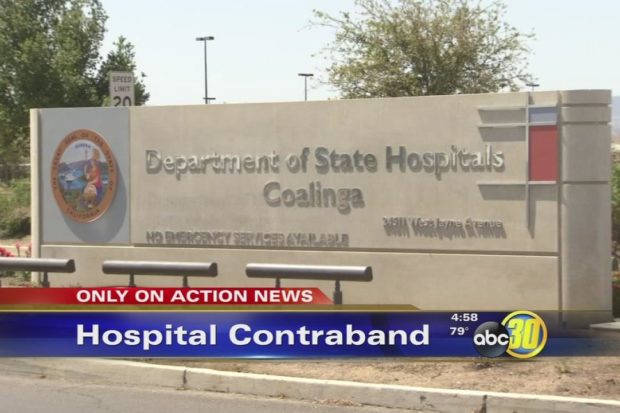
By Robert Turner
Within the confines of Coalinga State Hospital (CSH), a patient-organized group that distributes election material to patients and helps their peers therein register to vote wants to set the record straight about ongoing protests that have brought the hospital to a lockdown. Detainee-Americans for Civic Equality (DACE), comprising patients inside the state facility, say someone needs to clarify erroneous information coming from hospital officials. These hospital residents are disturbed that misinformation is being given to their families and attorneys over the recent turmoil in the treatment facility, painting an incorrect picture about the protests that started Jan. 12.
CSH is the largest facility in the nation devoted to concentrating and reeducating sex offenders. The nearly thousand civil detainees currently locked away in the state hospital are not there for punishment; everyone has completed their prison sentences, but state-sanctioned expert psychologist evaluators have determined that they are likely sometime in the future to commit a sex crime again. Hence, there is a civil rather than criminal designation to their confinement, which constitutionally requires that they be treated better than prisoners and housed in a “least-restrictive environment.”
DACE, to be clear, wasn’t organized to represent patients publicly, but the hospital-wide patient government cannot speak publicly because its bylaws don’t allow it to become involved in patient protests. Members of DACE find this void in balancing public information unacceptable. Since the hospital opened in 2005, patients there increasingly have viewed the hospital more as adversary than healer. In the past month, tensions have reached a breaking point.
The causes for the turmoil in the state facility are almost too numerous to mention, but one issue that seriously disturbs patients inside CSH is the conflating of the entire general population with a few patients who have been caught with child pornography. Because of this, patients have never been allowed access to the Internet, and now the administration is set to confiscate all remaining patient-owned computers. DACE asserts that fewer than one percent have been arrested on such charges, and far less than that have been convicted since the hospital opened.
Staff members who have been caught smuggling in illegal pornography have yet to be charged or convicted. The complicity of hospital workers in giving access to child porn, the small numbers of patients actually involved and the fact that the hospital doesn’t have the funds to investigate active cases are issues the administration would like to keep camouflaged, according to DACE.
The Department of State Hospitals (DSH) recently and underhandedly pushed through a major restriction to the type of electronic property it will allow patients to own. Rushed through as “emergency rulemaking” during Christmas week, DSH caught patients unaware and successfully thwarted patient residents, their families and attorneys from mounting timely challenges. DACE claims that the DSH failed in its duty to post these rule changes in advance, as procedures require, and that the department additionally failed to file the changes in a timely manner with the statutorily mandated vetting agency, the Office of Administrative Law (OAL).
According to one active DACE member who prefers to remain anonymous, it was this “Christmas surprise” that sparked the patients’ ire. The fact that the OAL not only seemed to abet the shady process but also rushed the approval through to the Secretary of State by Jan. 12 all combined to stir up the stressed-out population. The combative mood was set when new rules were announced at a town hall meeting of patient organizers in the auditorium that night, drawing a crowd of nearly 500.
Realizing that the administration again had succeeded in demonizing the entire population for the actions of a few left many seething. Pockets of disgruntled patients took to the halls and some, advocating civil disobedience, smashed several clocks, jammed door locks, overturned trash cans and splattered food.
Over the following nights, with shouts of “No justice, no peace!” as the clarion call, the level of destruction ramped up from unit to unit, though no workers or hospital officers were hurt during the protests. With the onset of the hospital lockdown on Jan. 14, the administration quickly acted to remove all patient access to incoming and outgoing telephone calls.
The patient population, says DACE in a Jan. 18 press release, feels completely dehumanized, especially upon learning the hospital will backtrack on granting Internet access. CSH’s civilly committed sex offenders, most of whom have completed their parole and so can vote in elections, are supposed to have all the rights afforded free citizens, short of being able to leave the grounds of the facility. The Supreme Court’s recent ruling ensuring sex offenders access to social media is being totally ignored by DSH officials.
Patients, who refer to themselves as “hosprisoners,” are already despondent over a decades-long unresolved federal suit against DSH and hospital administrators for what they feel are flagrant and ongoing violations of their civil rights. Over the past year, hospital staff have repeatedly taken away previously allowed property, upped already harsh restrictions on monthly packages, cut down on food quality and medical care, and refused to investigate the death of a patient at the hands of an officer.
The newly unveiled limits on electronics, reducing patients to just one TV, a radio and a CD player, seemed to ratchet things to an unacceptably oppressive limit. Patients at CSH just want to be treated as they are now classified by law— detained civilians—who ought not to suffer conditions of confinement worse than they suffered while serving their prison terms.
*****
Robert Turner is the community liaison for Detainee-Americans for Civic Equality (DACE). He spent 12 years after the end of his prison term confined in Atascadero and Coalinga state hospitals before finally being released in 2012.
